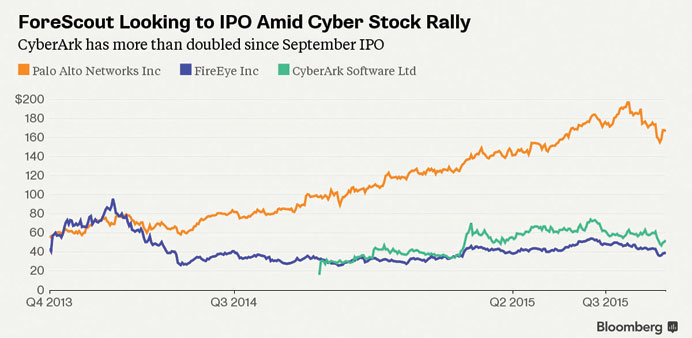Bloomberg/New York
In the six months since Mike DeCesare took over as chief executive of ForeScout Technologies, he’s been busy getting the cybersecurity company ready to go public.
Founded by three Israeli entrepreneurs in 2000, ForeScout specialises in network access control, or monitoring the profusion of smartphones, tablets and laptops that connect to computer networks and making sure they’re free of malware. DeCesare, a former president at McAfee, has been courting investors and recruiting high-profile tech executives to his board in preparation for a listing in 2016. He expects revenue to reach $150mn this year, the third year of 50% growth.
“We want to take advantage of the environment that we’re in right now,” he said in a telephone interview. “A lot of what we’re up to right now is just trying to make sure that that foundation is built in a way that we can really scale the business.”
ForeScout is betting it can take advantage of the price surge in cybersecurity stocks such as FireEye Inc, Palo Alto Networks, and CyberArk Software, another Israeli startup that has more than doubled since its initial public offering last September. The stream of high-profile data breaches are spurring companies to invest in more sophisticated protection from cyber-attacks, a trend likely to continue for the next 10 years, according to David Cowan, a partner at Bessemer Venture Partners in Menlo Park, California.
“I think they’re going to do very well, because there’s obviously a lot of fundamental demand for cyber solutions,” said Cowan, who has co-founded three data security firms himself. “The other companies that have gone public in cyber do not directly compete against ForeScout.”
Bessemer has not invested in ForeScout.
Forescout has raised almost $80mn from investors including Pitango Venture Capital and Accel Partners, according to the company.
DeCesare said he isn’t concerned that the global equity rout this month would hurt the company’s chances of going public. While US stocks lost as much as $2tn in market capitalization after China’s unexpected devaluation of the yuan on Aug. 11, they have since soared back, helped by a two-day rally that was the biggest sine March 2009.
Shares of FireEye and CyberArk are up 24% and 32% respectively this year, compared with a 2% gain in the Nasdaq Composite Index.
CyberArk, which focuses on privileged account security, has appreciated 227% since its IPO in September, and trades at 71 times 12-month future earnings, compared with an industry average of 40, according to data compiled by Bloomberg.
ForeScout considered going public in 2014, but never formally tried to do so, DeCesare said. The same year, CEO Gord Boyce stepped down and was replaced by interim manager T Kent Elliot, who had the job from 2003 to 2009, and now sits on ForeScout’s board.
In the 15 years since ForeScout was founded, it has turned itself into a “swiss army knife” of bundled cyber tools, Cowan at Bessemer said. It has 1,800 corporate and government clients, and competes with large network equipment companies like Cisco Systems and Aruba Networks, now owned by Hewlett-Packard Co.
It’s also expanded to monitor connections in the so-called Internet of Things. It shares the information it culls with other security vendors to give a company more context about what’s happening on its network.
“Their basic capability is network access control, and there I think they’re doing a good job competing with Cisco and other leading vendors,” said Shay Zandani, a co-founder of Tel Aviv-based security startup Cytegic. It’s unclear how competitive the company is in other areas, he said.
The network access control market grew 36% in 2014 to $460mn, according to technology research firm Gartner. That’s expected to slow this year to 20% because many companies have already implemented tools that monitor access to their networks. While Gartner named ForeScout a leader in the category, it’s still vulnerable to competition from incumbents, said Lawrence Orans, an analyst with Gartner.
“The risk is that infrastructure vendors like Cisco or Aruba and others will strengthen their products and add more functionality into their equipment,” he said by phone. Potential clients might say, “‘I’ll add on network access control features as opposed to a best of breed product.”’
While ForeScout’s products are more advanced than older rivals, there is already a new generation of startups whose technology has eclipsed ForeScout’s in specific areas, said Cowan.
“Long term, the ability to maintain their growth, and therefore a good multiple, will depend on whether they strategically acquire the new tech they need to stay competitive,” he said. “If they’re smart, they’ll use their stock currency to go out and do some shopping.”

